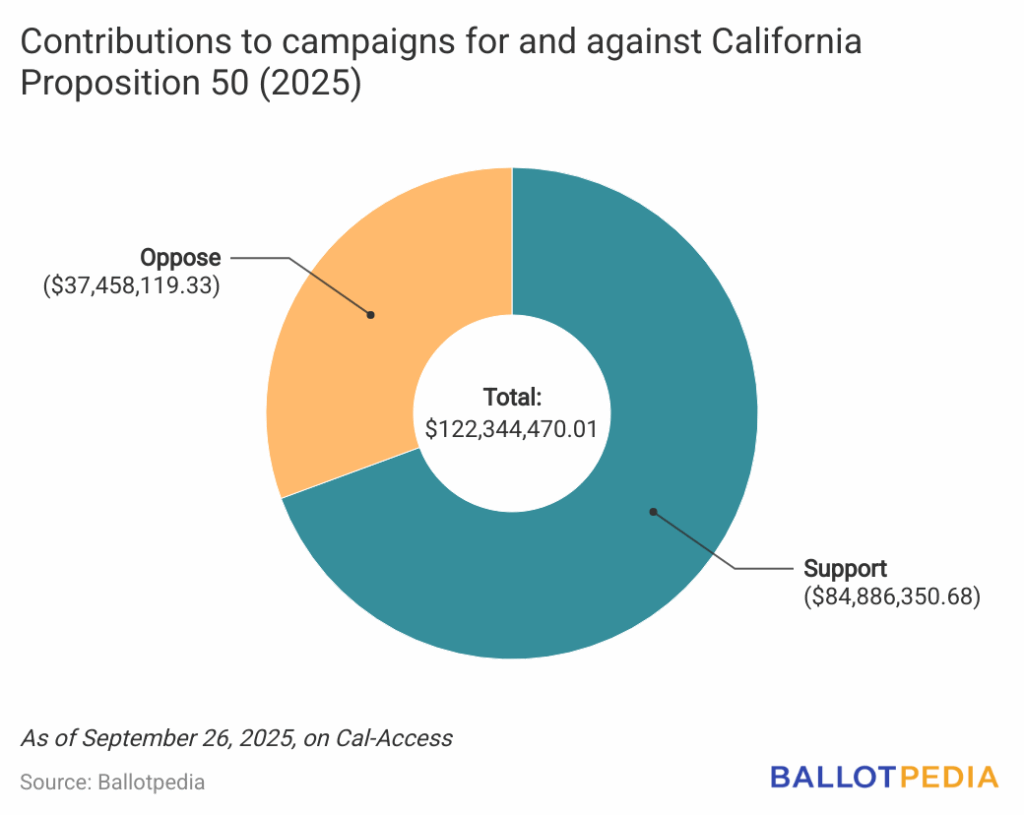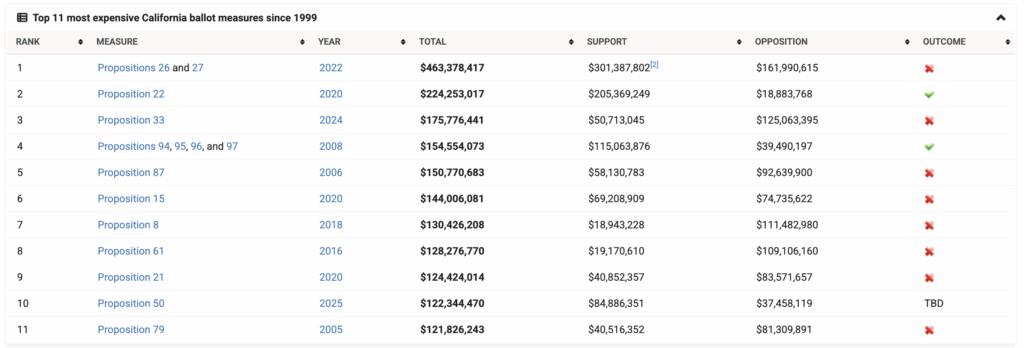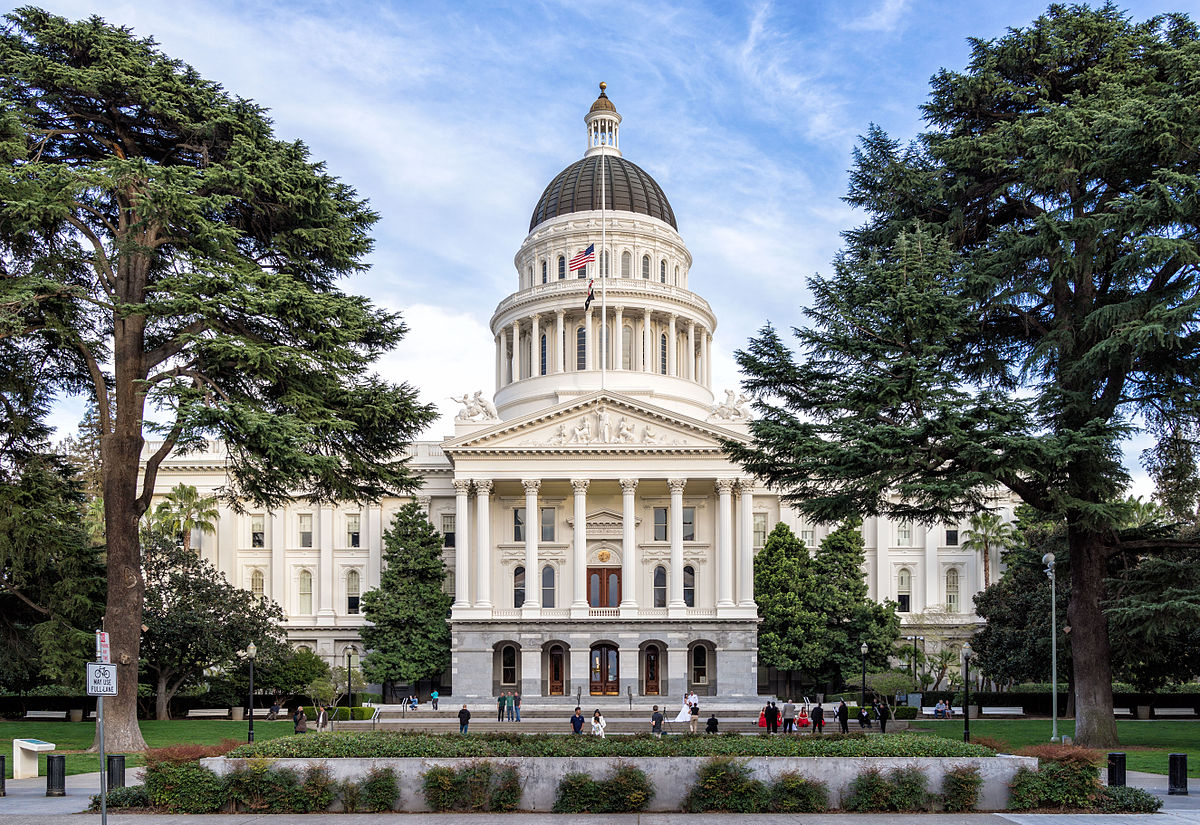Proposition 50 became the 10th most expensive ballot measure on record in California on Sept. 26, 2025, with five weeks until the election. As of Sept. 26, campaigns for and against the ballot measure had raised a combined $122.3 million.
Supporters of Proposition 50 reported $84.9 million in contributions, while opponents reported $37.5 million. This does not include contributions to multipurpose organizations, such as federal political action committees (PACs)—most of their spending, aside from some in-kind expenditures, consists of direct contributions to ballot measure committees.

On Sept. 25, campaigns filed their first regular pre-election reports since Proposition 50 was certified for the ballot on Aug. 21. While contributions of $1,000 or more must be disclosed within 48 hours, these reports provided the first look at sub-$1,000 donations. The regular pre-election reports covered the period between July 1 and Sept. 20.
- The support campaign reported 146,478 donations from 68,215 unique donors, with 51.2% residing in California. Contributions averaged $979 per donor, with a median donor contribution of $100, during this period.
- The opposition campaign reported 169 donations from 135 unique donors, with 88.9% residing in California. Contributions averaged $261,588 per donor, with a median donor contribution of $105, during this period.
These figures are calculated per donor, meaning multiple donations from the same person or organization were combined.
As of Sept. 26, the top five donors to the support campaign were:
- The Fund for Policy Reform (FPR) contributed $10.0 million. FPR is a 501(c)(4) associated with the Open Society Foundations, founded by George Soros. According to FPR's Form 990, the organization's mission is to support legislation that "assures greater fairness in political, legal and economic systems and safeguards fundamental rights."
- The House Majority PAC (HMP), along with the HMP for Prop 50 PAC, provided $7.6 million. HMP is a super PAC that focuses on electing Democrats to the U.S. House of Representatives.
- The California Teachers Association (CTA) Issues PAC contributed $3.0 million. CTA is a teachers union affiliated with the National Education Association.
- The California Democratic Party provided $2.91 million in in-kind contributions, such as phone banking, advertising, polling, printing, and other services.
- The California Nurses Association (CNA) contributed $2.6 million. CNA is a labor union for registered nurses.
As of Sept. 26, the top five donors to the opposition campaign were:
- Charles T. Munger, Jr. contributed $30.1 million. Munger, a physicist and political donor, is the son of Charles Munger Sr., who was a business partner at Berkshire Hathaway. He was chairperson of the Santa Clara County Republican Party (2012-2015) and the California Republican Party's Initiatives Committee (2013-2019). He contributed to several ballot measure campaigns in the 2000s and 2010s, including campaigns to create the California Citizens Redistricting Commission.
- The Congressional Leadership Fund (CLF) provided $5.0 million. The CLF is a super PAC that focuses on electing Republicans to the U.S. House of Representatives.
- The Kevin McCarthy for Congress PAC contributed $1.0 million. McCarthy was Speaker of the U.S. House of Representatives from Jan. 2023 to Oct. 2023, and a representative from 2007 to 2023.
- Thomas M. Siebel, founder and chairman of C3.ai, Inc., contributed $1.0 million. He founded Siebel Systems, which he sold to Oracle in 2006, and established C3.ai in 2009. He also hosted fundraisers for Donald Trump's presidential election campaign in 2024.
- Susan Groff, who co-owns Northwest Excavating with her husband, contributed $50,000.
After Proposition 50, the next most expensive ballot measure campaign was for and against California Proposition 21 of 2020. Campaigns received a combined $124.4 million, with opponents outraising supporters $83.6 million to $40.8 million. Proposition 21 was defeated. Among the 10 most expensive ballot measures, the side that raised the most funds won in nine of the 10 cases. The exception occurred in 2024, when competing sports betting initiatives resulted in each campaign supporting one measure while opposing the other.

The next regular pre-election campaign finance reports for California Proposition 50 are due on Oct. 31, 2025. The special election is Nov. 4.
Additional reading:



